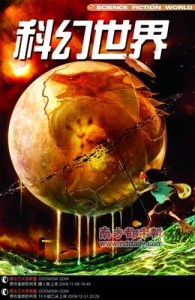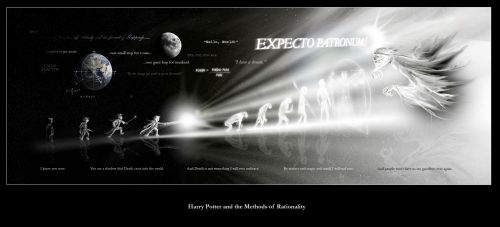Even when zooming down to the private angst of one narrow life, we in this genre remain keenly aware of the context - our shared drama and the poignancy of change. I'll talk some more about this below... and in my next posting...
...only let's start this session with some sf'nally related news and links.
Watch a riveting interview with master science fiction author (and my bro) Kim Stanley Robinson, probably the most thoughtful author in our field, with the deepest perspective on this brave genre of human literature.
Alas, few try as hard to break cliches. My classic essay: "The Idiot Plot" - showing why civilization is treated with contempt by almost all novels and films - has finally been published online. It dissects the basic need of modern drama - to keep your heroes in jeopardy! But how that need as evolved into a wretched cheat: the blanket assumption that society is wholly corrupt and all your fellow citizens are sheep. A poison-meme that harms us all, that has its origins not in truth... or in malevolence... but in sloth.
Dolphins in space? The always fun io9 site lists the 10 most-epic science fictional uses of dolphins.
Speaking of which... This short video showing a real-life bottlenose dolphin seeking help from a diver is both a moving moment... and almost exactly like a scene in my novel EXISTENCE.
 Read it in "Aficionado" - an excerpt from EXISTENCE that stands well alone, available for free download.
Read it in "Aficionado" - an excerpt from EXISTENCE that stands well alone, available for free download.
Orbit has just released EXILES - the 2nd Uplift Omnibus containing the complete Second Uplift Trilogy. Nice cover! Good (epic) story too. ;-) FInd out what happened to the dolphin-crewed Streaker!
In further SF news: Extreme Planets is a science fiction anthology of stories set on alien worlds that push the limits of what we once believed possible in a planetary environment. Visit the bizarre moons, dwarf planets and asteroids of our own Solar Systems, and in the deeper reaches of space encounter super-Earths with extreme gravity fields, carbon planets featuring mountain ranges of pure diamond, and ocean worlds shrouded by seas hundreds of kilometres thick. The challenges these environments present to the humans that explore and colonise them are many, and are the subject matter of these tales. The anthology features 15 tales from leading science fiction authors and rising stars in the genre. With both repreints and new stories by Gregory Benford, David Brin, Peter Watts, G. David Nordley, Jay Caselberg and many more.
I have earlier recommended the best work of FanFiction out there - Eliezer Yudkowsky's marvelous alternate take on magic - "Harry Potter and the Methods of Rationality" - exploring JK Rowling's world with far greater intensity and curiosity than the original. There's a pretty strong fan base, as illustrated by the portrayal (below) of one of Eliezer's best scenes. He writes at master level and explores not only the boundaries between science and magic, but one of the most interesting and infuriating boy-geniuses since Huckleberry Finn. Still... it seems bizarre putting that much talent and time into something he'll never make a cent at!
Oh, speaking of never getting paid... and paying homage to the past... Amateur Star Trek productions keep getting better. Still a bit amateurish... especially in matters of plot... but improving steadily. This one: "Of Gods and Men," stars Walter Koenig and Nichelle Nichols, among others. Hey, why not?
== SF in the East - how do we repay the past? ==
I was in China way back in 2007, at a conference on science fiction, which is gradually gaining traction in that mighty and ancient nation. Gradually, I came to realize the underlying reason why its been so gradual in a land where its attitudes of gumption and change are much-needed and so apropos. Oh, I can understand why the government had one of its intermittent (mild, this time) squelchings of SF. It is, after all, inherently somewhat subversive of too-rigid authority, by virtue of imagining things different than they are. Sorry, but change will happen -- and much better if it is explored first with our minds!
Nevertheless, at the conference, I witnessed something else -- the discomfort that SF causes even in its friends in the Central Kingdom. It was a very friendly room... and yet, a young man rose to ask me: "How can we talk about a better future or improvable humanity? Does that not insult our ancestors?"
I had to blink in wonderment... while others all around the room nodded in agreement with his worried question. Clearly this was one of those moments that distilled something deep and strangely different between two cultures, trying hard to understand each other. Before responding, I thought carefully, then asked:
"Do you want your own children to be less than you? Shall they repeat all of your mistakes? Should what was assumed for past generations always be assumed, in a context of forever-changeless truth?"
 It flashed through my mind when I had posed this question last: to a gathering of that most-eastern clade back home -- professors of English Literature -- most of whom clutch to fixed notions of "eternal verity."
It flashed through my mind when I had posed this question last: to a gathering of that most-eastern clade back home -- professors of English Literature -- most of whom clutch to fixed notions of "eternal verity."
"Or else..." I asked the audience in Chengdu. "Do you hope your children will rise up and excel and accomplish what you cannot accomplish in this life? Shall they learn from your mistakes and thus perhaps evade them? All your efforts on their behalf - do you want those efforts to pay off? For those kids to be better than you?"
His turn to ponder... then the young man nodded vigorously. Yes to all of the above.
"And don't you think your ancestors felt that way about their children? And your parents about you?"
He nodded again. This time, a few in the audience, despite awkward translation, seemed to get where I was going - a light of understanding in their eyes.
"Then why do you call it betrayal of those ancestors - insulting them - to proclaim that they succeeded? That their fondest wish came true? If you say that we're no better than them, aren't you the one who is insulting earlier generations, by proclaiming that they failed?
"Science fiction is our tool for exploring how the future might become better... or worse. And by exploring the worst, we help make the better more likely!
"We stand upon the shoulders of our ancestors, doing the very task that they assigned to us, the task of rising higher than them. They made possible the wonder that is us! And we repay them by providing good footing for our children to plant their own feet on our shoulders. And I will gladly bear that burden, both in life an in whatever comes after death. Forever.
"I know that you will do the same."
That got smiles and a hearty round of applause. And I realized something then, about one of the difficulties faced by the forward-facing literature and far-looking frame of mind. It has always been a hard sell. Indeed, a culture - like a person - sometimes needs a metaphorical bridge.
In this case, SF must offer a way out for Asian fans who, nevertheless, were raised in deepseated traditions of past-veneration, that flow far below where communism ever touched. When we write about the effects of possible change -- good, bad or scary or inspiring -- we must also offer grounding -- a footing -- in the Shelter of Tradition.



33 comments:
Post a Comment